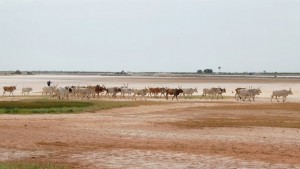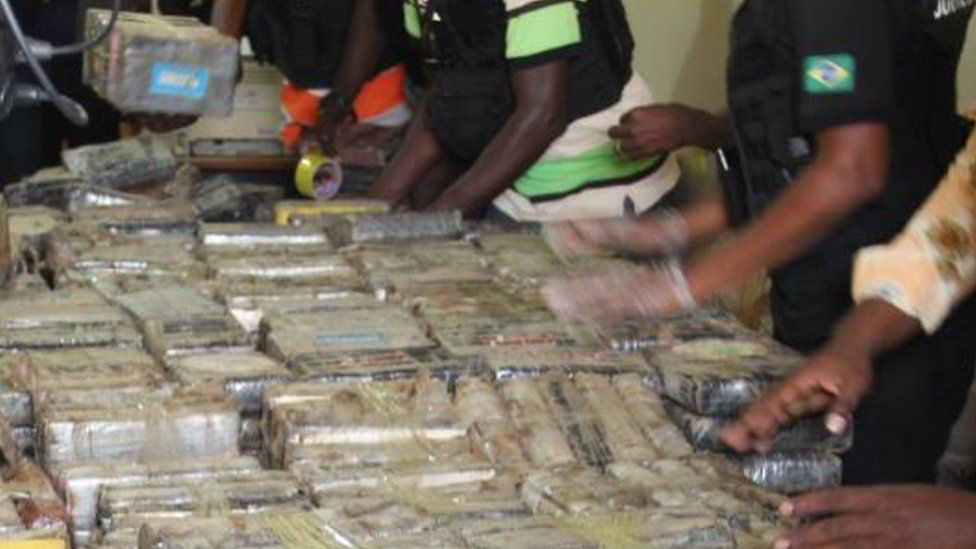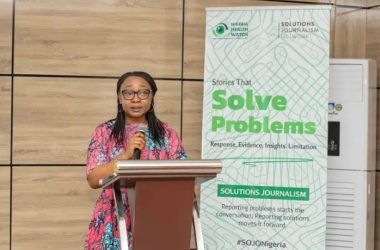 Addressing a standing room only crowd of global agriculture experts at the FAO headquarters in Rome, 2017 World Food Prize Laureate and President of the African Development Bank, Akinwumi Adesina, says the answer is a resounding yes!
Addressing a standing room only crowd of global agriculture experts at the FAO headquarters in Rome, 2017 World Food Prize Laureate and President of the African Development Bank, Akinwumi Adesina, says the answer is a resounding yes!
He believes Africa does not need aid but disciplined investments. According to this grandson of a subsistence farmer, he says the time has come to view investment and development opportunities in Africa through a totally different lens.
With over 800 million people worldwide suffering from hunger and more than two billion affected by malnutrition, food insecurity remains a real threat to global development.
Adesina, who is making a global pitch for renewed visionary leadership and strategic alliances, “the future of food in the world will depend on what Africa does with Agriculture.”
The African Development Bank, which he leads, envisions a food secure continent which uses advanced technologies, creatively adapts to climate change, and develops a whole new generation of what he describes as ‘agripreneurs’ – empowered youth and women who he expects to take agriculture to the next level.
By 2050, an additional 38 million African will be hungry. The paradox of lack in the midst of plenty, and Africa’s growing youth bulge are some of the reasons why Adesina’s sense of urgency is resonating with numerous government, private sector, and multilateral leaders during recent European and Asian trips. The banker and 2017 World Food Prize Laureate will be the first to admit that he considers himself the ‘evangelist-in-chief’ for a food secure Africa.
Africa continues to import what it should be producing, spending $35 billion on food imports each year, a figure that is expected to rise to $110 billion in 2025 if present trends continue.
A few days later, Adesina joined Rockefeller Foundation President Raj Shah, Unilever CEO Paul Polman, and 2018 World Food Prize nominees Lawrence Haddad and David Navarro, among other prominent global academic, development, and agriculture experts at Wageningen University and Research, in the Netherlands, to make the case for urgent collective action by State and non-State players to accelerate Africa’s agricultural growth and transformation.
Africa receives only 2 percent of the $100 billion annual revenues from chocolates globally. Adesina tells his audience that “adding value to what nations produce, is the secret to their wealth. Producing chocolate instead of simply exporting cocoa beans does not require rocket science.”
To expand opportunities for youth, women, and private sector players, Adesina is on a global mission to promote and seek support for the bank’s Affirmative Finance for Women in Africa (AFAWA) program which aims to mobilize $3 billion to support women entrepreneurs who historically lack access to finance, land, and land titles; a $300 million ENABLE Youth program to develop the next generation of agribusiness and commercial farmers for Africa; and a new global investment marketplace, the African Investment Forum, which will be held in Johannesburg November 7-9.
In separate meetings with Sigrid A.M. Kaag, Minister for Foreign Trade and Development Cooperation, in the Hague; Peter van Mierlo, CEO of the Dutch Entrepreneurial Development Bank (FMO), key private sector players, and members of the Dutch Foreign Affairs Advisory Council, Adesina said Africa and its partners must seize unprecedented opportunities for innovative partnerships and increased development impact.
Mierlo believes, “a huge benefit for Africa is that it can skip development cycles that often almost all developed countries had to go through, by deploying new technologies such as artificial intelligence and robotics in agriculture”.
In a continent where more than 640 million are without electricity, Adesina says the private sector is key to Africa’s development in Africa’s energy and agriculture sectors.
“If Africa is going to turn the tide of irregular migration, this is critical. There are three ways in which we can collaborate: either through the NEPAD Infrastructure Project Preparation Facility, Africa 50 – a private equity institution which has raised more than US$ 850 million from 22 countries, and the new Africa Investment Forum.”
Adesina, recognizes that the lack of electricity is Africa’s biggest development impediment. The Bank’s new and ambitious Desert-to-Power initiative which aims to generate 10,000MW of power across Africa’s Sahel region will be critical to reducing migration and climate change impacts. We will do this through a blended finance mechanism with guarantees”, Mr. Adesina said.
Speaking to a High-level Roundtable of Dutch Business Leaders at the Netherlands Enterprise Agency (RVO), informed key private sector leaders that “governance structures and business regulatory environments are changing in Africa. Indeed, several African countries have already made significant progress in improving their general business and investment environments. Africa is doing better than some of the Asian countries,” he reminded his audience.
“In the energy sector, the African Development Bank is investing $12 billion over the next 5 years, with the goal of leveraging $40-50 billion; and an additional $US 24 billion, over ten years, in agriculture to implement its Feed Africa Strategy.”
Agriculture steadily taking center-stage
The strategy is already bearing fruit with the establishment of Staple Crop Processing Zones in several African countries, including Ethiopia, Togo, Democratic Republic of Congo, and Mozambique, with a plan to reach 15 countries in a few years.
Strategically located in and around rural farming communities Adesina says “these agriculture zones will form the nucleus of a new wave of agro-industries and greenfield ventures, attracting agripreneurs, was biotechnology firms, intellectual and capital investments. They will also ensure that foods are processed and packaged right where they are produced, rather than in urban centers far removed from centers of production.”
Described as a visionary optimist by many colleagues, Adesina believes the bank’s policies and investments will help turn rural areas from zones of economic misery into zones of economic prosperity.
Distributed byAPO Group on behalf of African Development Bank Group (AfDB).






**”Speaking to a High-level Roundtable of Dutch Business Leaders at the Netherlands Enterprise Agency (RVO), informed key private sector leaders that “governance structures and business regulatory environments are changing in Africa. Indeed, several African countries have already made significant progress in improving their general business and investment environments. Africa is doing better than some of the Asian countries,” he reminded his audience”.
**”Strategically located in and around rural farming communities Adesina says “these agriculture zones will form the nucleus of a new wave of agro-industries and greenfield ventures, attracting agripreneurs, was biotechnology firms, intellectual and capital investments. They will also ensure that foods are processed and packaged right where they are produced, rather than in urban centers far removed from centers of production.”
**The strategy is already bearing fruit with the establishment of Staple Crop Processing Zones in several African countries, including Ethiopia, Togo, Democratic Republic of Congo, and Mozambique, with a plan to reach 15 countries in a few years.
**”In separate meetings with Sigrid A.M. Kaag, Minister for Foreign Trade and Development Cooperation, in the Hague; Peter van Mierlo, CEO of the Dutch Entrepreneurial Development Bank (FMO), key private sector players, and members of the Dutch Foreign Affairs Advisory Council, Akinwumi Adesina said Africa and its partners must seize unprecedented opportunities for innovative partnerships and increased development impact”.
There’s a reason for reproducing the segments is to present food for thought for members of this forum and the general readership to subscribe to a discussion on the points raised by Mr Adesina.
I am a Senegambian from a rural background like Akinwumi Adesina that only became convinced that commercial farming is worth the while after pursuing degrees in the Crop and Animal Sciences and then proceeding to venture into commercial farming. Hitherto, there was never concrete evidence that farming in our part of Africa in cash crop production, as we knew it, was worth anybody’s while. The glaring reality was that, as the song goes, our poor parents worked from sunup till sundown without making headway. It’s important to add that agriculture can only be meaningful and worth the while if one knows what they’re doing. There’s also little value in part-time farming as we know it in West Africa. Farming is indeed a FULL time undertaking!
What’s evident in Africa is that policy planners are numbers guys and are keen on socio-metrics touting snap shots on the potential for growth in African agriculture. What is not clear however is the HOW TO’s when it comes to a pragmatic approach to implementing programs designed to get African youth into farming in the first place. Facilitating access to secure lending, farm and other support services present additional concerns.
I will not attempt to justify or debunk numbers on this article but would propose the following:
1. The African Development Bank and the World Bank must work to make access to agricultural credit/lending in Africa less cumbersome. A strategy that would require access to funding through local credit unions and also provide incentives to banks to create agricultural lending arms among other strategies.
2. The African Development Bank should study the land bank model for the object of creating a sustainable model(s) for the targeted “15 countries in a few years” that could be replicated in Africa.
3.The African Development Bank must look to work outside of central governments in support of community groups and non profits that understand the lay of the land and how the bugs bite. In other words, feel the pinch.
4. Create direct linkages between private investors, retired commercial farmers, university systems, donors and African farmers/Agripreneurs! A move that will not only work to shorten the learning curve for young agricultural entrepreneurs but also create the human capacity within a shorter time frame. I have witnessed tangible results come out of the collaborative efforts of a retired Dutch university professor, a Dutch non profit and African entrepreneur.
Africa needs to focus on investments that target larger scale production as opposed to small scale subsistence production. Africa, particularly the Senegambia region and other areas in the Sahel region must focus on going beyond feeding the population to producing food surpluses that can then be the object of “Value Added Food Products”.
Until Africa is able to reach this goal, the question, “would the future of food in the world depend on what Africa does with agriculture” will remain a pipe dream!
Very pertinent recommendations to the ADB and the WB.
Why haven’t they intervened to maximize production and open up markets for our agricultural products becomes the next logical question, Andy.
Despite all the fruits like mangoes, oranges, papaya etc , that are produced in The Gambia, still no factory exists to make juices from these vitamin rich fruits. But still we import millions of cartons of canned juice for consumption.
That leads me to the next question for Andy.
Do you think it will be in the interest of the international lending agencies especially the IMF and the WB if we become food self sufficient and exporting nations of processed foods and foodstuff? How?
Best sincere greetings.
Good points Mwalimu,
Dr Barrow, should have been plying for trade, rather than aid.
I remember when I use to see mangoes on the shelves of Tesco in the UK, which where imported from The Gambia.
And your correct, that pay day loan company, the IMF, it’s not in their interest to see any country that they are collecting interest from, to become too self sufficient or independent.
On another note, I think that the EU or UK are not purchasing groundnuts from The Gambia anymore, because of some high natural toxic chemical found in the nuts, which the Chinese have no problem with purchasing, but you see these people, they love to move the goal posts, when it suits them, meaning, if the UK or EU, where heavily invested in the groundnuts in The Gambia as before, the toxin would have not been a problem, infact you probably wouldn’t even known about it!
Mwalimu asks,
“Do you think it will be in the interest of the international lending agencies especially the IMF and the WB if we become food self sufficient and exporting nations of processed foods and foodstuff? How”?
Upon close scrutiny Mwalimu, one may conclude that the subtle tactics employed by multilateral and bilateral donors and lenders in particular point to disingenuity in many instances.
The French and Belgians in particular would send advanced teams of lobbyists to pave the way for companies and chambers of commerce for the object of sealing “business” deals.
Most lenders, while claiming to be non partisan, would rather have beneficiaries do business with their own favored “blue eyed” agencies that mostly wield immense political influence on the ground.
At the end of the day Mwalimu, a thorough analysis would lead one to believe that that the ultimate desire of lenders is to a create a dependency that ensures the long term profitability and survival of well connected home based entities that are typically at the forefront of political lobbies! One could go further to question where the interests of lenders and donors really lie.
Mwalimu, my position in respect of enhancing agricultural production in The Gambia is to firstly move the Ministry of Agriculture to the Central River Region from where the services rendered would fan out to the rest of The Gambia. Efforts targeting irrigated agriculture could also be sensibly supported by The Gambia river. What’s the point in investing Millions in the Sapu Agricultural Station and then foolishly allow the investment to rot away. Then the government goes back to borrowing in the name of the Gambian people to reinvent the wheel all over again. You see Mwalimu what keeps being repeated in The Gambia amounts to what’s in Manding, TAWUNTAY YAA, KULUBALIYAA or in Wolof, DOFF DOFFLU AK HAMADI!!
The Arab nations, using oil revenues and sovereign funds as leverage, are equally complicit in the veiled and unsavory lending practices to poor nations! Does it appear that lenders are really sympathetic to our causes as Africans? Well, that’s subject to serious debate, isn’t it?
Think Belgium and fronting for De Beers, the US and Cargill or Caterpillar and the French with Renault!
It’s good that you brought the subject up Mwalimu.
And I do agree with your position that charity begins at home. Let’s start from within to reverse the steady state of decline in food production in The Gambia.
I couldn’t ask for a more concise and an expert analysis of the relationship between our agricultural sector and the international credit sharks. Andy keep on talking, you have my ears and my attention. Teach me.
“Development Partners” is the internationally recognised term used to describe Western Financial, Economic, Political/Non political Institutions and organisations that are involved in Africa’s development efforts, and God knows they have pumped a lot of funds and resources into the continent, as well as provided much needed technical assistance for that purpose.
However, the situation of the continent and the reality of our relationship with these “partners”, not excusing our own complicity, makes one wonder whether there is sincerity and genuine interest to see Africa develop in the real sense.
Nearly a century of “parrnership”, if genuine and sincere, should have yielded a situation that is completely different from what is today.
Mwalimu has asked very sobering questions that should get all thinking.
Personally, I believe it will be economic and political suicide for our “partners” to assist Africa to develop in a way that makes the continent a serious competitor on the global stage, and you only have to observe how the West is reacting to emerging powers, like China, Russia, Iran, etc to have an idea. Equally, a look at any statistical data on what the real picture of the inward and outward flow of resources are, into and out of the continent, will further increase one’s scepticism.
Thus, when you read about individuals, like former UK Premier, Tony Blair, cozzying up to your government and acting like a cheer leader, you know, or rather, should know, that somewhere along the line, your own government is working against your national interest.
We definitely need institutions, like the African Development Bank, to facilitate and help maintain sustainable development in the continent, but when you hear these neoliberal fanatics arguing for a “private sector” led development model as the ONLY way for Africa: a continent that has not got the private sector and must rely on foreign “investment” (more like exploitation), you know that our questions are yet to be answered.
Nonetheless, we must continue to ask the questions and raise our concerns.
Bax, you raised valid points in the commentary,
“However, the situation of the continent and the reality of our relationship with these “partners”, not excusing our own complicity, makes one wonder whether there is sincerity and genuine interest to see Africa develop in the real sense”.
In the Gambian context, one could surmise that the policy planners and leadership bring their own incompetence into the mix for the object of creating chaos and other distractions. From experience Bax, I’d add that Gambian planners and politicians love chaos because they ultimately profit and thrive on the very chaos that’s largely self made. We are seeing that M.O. in play with the Barrow government. Look at how many Gambian executives have gone on to live the “big life” on monies looted from central government and public corporations? Monies that are stashed away in foreign accounts that offer no benefits whatsoever to needy Gambians. Someone dies of an unexpected heart attack and poof, all that money is gone!!
On the food production front, nations such as Sierra Leone and Guinea are blessed with two rains in the year but the question is how much headway these nations have made on the food security front. The Gambia must start with setting a goal of producing two harvests, rain fed and irrigated (dry season), per crop. Be they Rice, Corn, Sorghum or root crops. A goal that’s clearly attainable if the youth will be provided with incentives to relocate to the CRR and URR to settle down to the business of boosting production to not only feed the nation but also put cheaper food on family tables.
Folks this is absolutely doable if the Gambian government will stop parroting an NDP that’s yet to be funded but instead focus on tackling hunger plus the attendant food desert!
When such brains are at work, mine just got to absorb great stuff that’s being produced. I allow myself to let this out: from their critical discourse on agriculture, agricultural production and financing and our development as a people, I am able to glean a common theme, which is the internal and external stranglehold impeding our prosperity.
Gentlemen, what is the way forward?